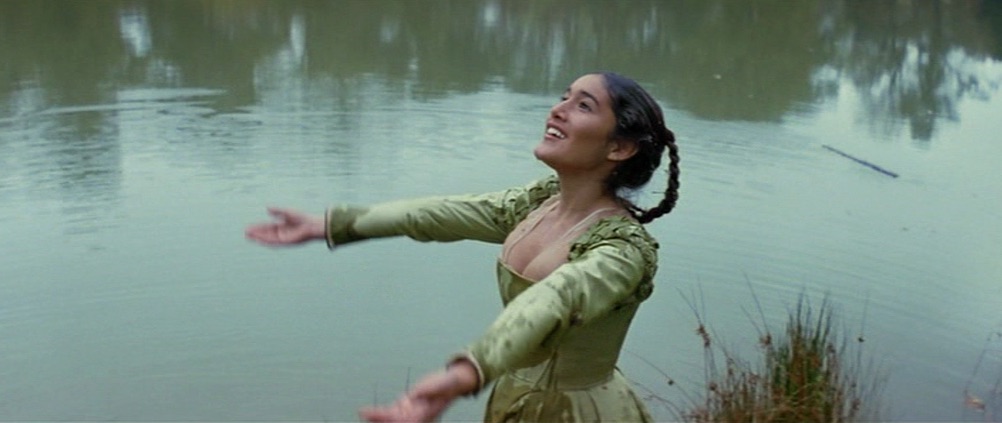"The New World": Heideggerian or Humanist Cinema?
DOI:
https://doi.org/10.58519/aesthinv.v3i2.11936Keywords:
Heidegger, Philosophy Without Theory, Cinematic Humanism, Terrence Malick, The New WorldAbstract
I offer a new Heideggerian reading of Terrence Malick’s 2005 film The New World, in the style of film-philosophy, alongside a contrasting Cinematic Humanist encounter. I consider if the former is a theory-involving example of philosophy of film, and whether a positive answer to this question entails the latter must be also. I argue that the whilst both engagements with the film use the work of other philosophers as part of their appreciation, Cinematic Humanism nonetheless remains one of many possible ways of doing philosophy of film without theory. Having compared these two methods, I suggest reasons why there is nonetheless a potentially valuable relation to be had between philosophy of film with and philosophy of film without theory. Close attention is paid to the film throughout.
Downloads
References
Barnett, Christopher B. 2013. “Spirit(uality) in the Films of Terrence Malick”. Journal of Religion and Film. 17(1) Article 33.
Cavell, Stanley. 1979. The Claim of Reason: Wittgenstein, Skepticism, Morality and Tragedy. Oxford: Oxford University Press.
Cavell, Stanley. 1981. Pursuits of Happiness: The Hollywood Comedy of Remarriage. Cambridge, Mass: Harvard University Press.
Cousins, Marc. 2007. “Praising The New World” in Hanna Patterson, (ed.) The Cinema of Terrence Malick: Poetic Visions of America. 2nd Edition. New York: Wallflower. 192-198
Critchley, Simon. 2002. “Calm -- On Terrence Malick's The Thin Red Line.” Film-Philosophy 6 (48) December Available at: www.film-philosophy.com/vol6-2002/n48critchley [accessed March 2016]
Donougho, Martin. 2011. “ “Melt Earth to Sea”: The New World of Terrence Malick.” The Journal of Speculative Philosophy. 25 (94) 359-374.
Fox, Craig & Harrison, Britt. 2020. “Inaugurating Philosophy of Film Without Theory.” Aesthetic Investigations this issue. 175-184.
- forthcoming. Philosophy of Film Without Theory. Palgrave Macmillan.
Furtstenau, Marc and MacAvoy, Leslie. 2007. “Terrence Malick’s Heideggerian Cinema: War and the Question of Being in The Thin Red Line.” in Patterson, H. (ed.) 164-178.
Garrett, Daniel. 2008.”The American Sublime, the Sublime American: The New World by Terrence Malick, Nature and Civilization, Individuality and Consciousness.” Cinetext Internet Forum. Available here: http://cinetext.philo.at/magazine/garrett/thenewworld.html [Accessed 3.5.2016]
Heidegger, Martin. 1962. Being and Time. translated by John Macquarrie & Edward Robinson Oxford: Blackwell.
- 1971. On the Origin of a Work of Art. translated & introduced by Albert Hofstadter New York: Harper & Row.
Heidegger, Martin. 1977. Basic Writings. (ed. David Farrell Krell) New York: Harper & Row.
Loht, Shawn. 2013. “Film as Heideggerian Art? A Reassessment of Heidegger, Film, and His Connection to Terrence Malick.” Film and Philosophy. 17. 113-136.
- 2015. “The Relevance of Heidegger’s Conception of Philosophy to the Film-as-Philosophy Debate.” Film and Philosophy.19. 34-53.
Maher Jr., Paul. 2014. One Big Soul: An Oral History of Terrence Malick. Lulu.com 3rd Edition.
Martin, Adrian. 2007. “Approaching The New World.” in Patterson, Hanna ed. (2007) The Cinema of Terrence Malick: Poetic Visions of America. 2nd Edition. New York: Wallflower.
Michaels, Lloyd. 2009. Terrence Malick. Chicago: University of Illinois Press.
Morrison, James. 2007. “Making Worlds, Making Pictures: Terrence Malick’s The New World” in Patterson, Hanna ed. (2007) The Cinema of Terrence Malick: Poetic Visions of America. 2nd Edition. New York: Wallflower 199-212
Neer, Richard. 2011. “Terrence Malick’s New World.” Screening The Past. https://nonsite.org/feature/terrence-malicks-new-world.
Nicol, David. 2011. “Understanding Virginia; Quoting the Sources in Terrence Malick’s The New World” Screening The Past. 11. Available here: http://www.screeningthepast.com/2011/11/understanding-virginia-quoting-the-sources-in-terrence-malick%E2%80%99s-the-new-world/ [Accessed 3.6.19]
Patterson, Hanna. (ed.) 2007. The Cinema of Terrence Malick: Poetic Visions of America. 2nd Edition. New York: Wallflower.
Rybin, Steven. 2011. “Voicing Meaning: On Terrence Malick’s Characters” in Thomas Dean Tucker & Stuart Kendall (ed.s) Terrence Malick: Film and Philosophy. London: Bloomsbury 13-39.
- 2012. Terrence Malick and the Thought of Film. Lanham, Maryland: Lexington Books.
Silverman, Kaja. 2003. “All Things Shining.” in David L. Eng and David Kazanjian (eds.) Loss: The politics of Mourning. Berkeley, CA: University of California Press. 323-342.
Sinnerbrink, Robert. 2006. “A Heideggerian Cinema?: On Terence Malick’s The Thin Red Line.” Film-Philosophy. 10 (3). 26-37.
- 2011. New Philosophies of Film: Thinking Images. London: Continuum.
- 2014. “Cavellian Meditations: How to Do things with Film and Philosophy.” Film-Philosophy. 18 Special Section on Stanley Cavell. 50-69.
- 2015. “From Mythic History to Cinematic Poetry: Terrence Malick’s The New World Viewed.” Screening the Past (01) Available here:
http://www.screeningthepast.com/2015/01/from-mythic-history-to-cinematic-poetry-terrence-malick%E2%80%99s%C2%A0the-new-world%C2%A0viewed/ [Accessed 3.6.2016]
- 2019. Terrence Malick: Filmmaker and Philosopher. London: Bloomsbury Academic.
Weitz, Morris. 1956. ‘The Role of Theory in Aesthetics.’ The Journal of Aesthetics and Art Criticism. 15 (1). 27-35
Wittgenstein, Ludwig. 1961. Tractatus Logic-Philosophicus. translated by D.F. Pears and B.F. McGuinness. London: Routledge and Kegan Paul.
Wittgenstein, Ludwig. 1982. Last Writings on the Philosophy of Psychology. Volume I. edited by G. H. von Wright and Heikki Nyman, translated by C.G. Luckhardt and M.A.E. Aue. Oxford: Blackwell.
Wittgenstein, Ludwig. 2009. Philosophical Investigations. trans. G. E. M. Anscombe, P.M.S. Hacker, and Joachim Schulte Rev. 4th ed. by P.M.S.Hacker and Joachim Schulte Oxford: Blackwell.

Downloads
Published
Issue
Section
License

This work is licensed under a Creative Commons Attribution 4.0 International License.
Authors who publish with this journal agree to the following terms:
Authors retain copyright and grant the journal right of first publication with the work simultaneously licensed under a Creative Commons Attribution License that allows others to share the work with an acknowledgement of the work's authorship and initial publication in this journal. Note: up to volume 4 issue 1, an incorrect copyright line appears in the PDFs of the articles.
Authors are able to enter into separate, additional contractual arrangements for the non-exclusive distribution of the journal's published version of the work (e.g., post it to an institutional repository or publish it in a book), with an acknowledgement of its initial publication in this journal.
Authors are permitted and encouraged to post their work online (e.g., in institutional repositories or on their website) prior to and during the submission process, as it can lead to productive exchanges, as well as earlier and greater citation of published work (See The Effect of Open Access).





